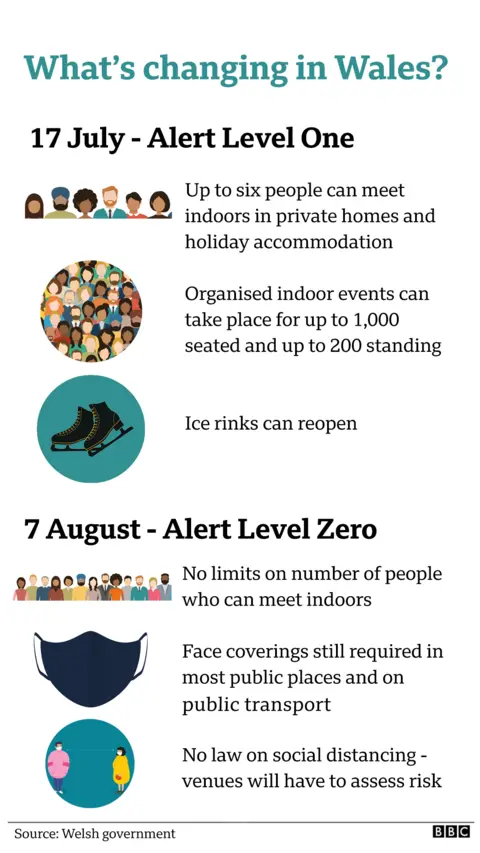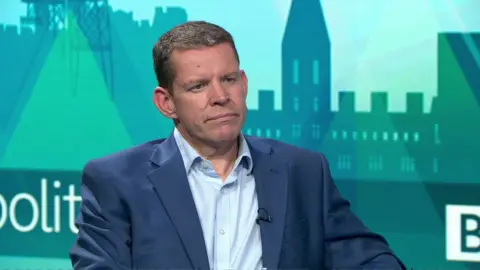Covid: Plaid urge caution over easing rules in August
 Getty Images
Getty ImagesWales should not get rid of most Covid rules in early August if cases are rising, according to Plaid Cymru.
Health spokesman Rhun ap Iorwerth hopes the majority can be removed but said "we have to be willing to put the brakes on if the signs aren't good".
The Welsh Conservatives said only significant rises in hospital admissions or a new variant of concern should delay ending restrictions.
The first minister said the situation would be kept "carefully under review".
Most rules are set to be scrapped by the Welsh government from 7 August if the public health situation allows.
It would mean that all laws on the number of people who can meet are scrapped and nightclubs would be able to reopen.
But face masks would still be required in most indoor public places, except in pubs and restaurants.
Some restrictions were eased on Saturday, allowing six people to meet in private homes and holiday homes, 1,000 people to sit and 200 stand at organised indoor events, and ice rinks to reopen.


Speaking to the BBC Politics Wales programme, Mr ap Iorwerth, Plaid's deputy leader and Anglesey MS, said: "It's not over-cautiousness, it's proper and the kind of cautiousness that the people of Wales have supported.
"I'm hoping that we will be in a good place in August to move forward.
"But we have to be willing to put the brakes on if the signs aren't good."
On Friday, Wales had reached an average of 704 cases a day - up from an average of 553 the week before.
Asked if he would refrain from lifting restrictions if cases were rising but not leading to huge pressure on the NHS, Mr ap Iorwerth said: "I'm not comfortable in saying, as I think the UK government is saying for England, 'let's just let rip'.
"There's good evidence, especially around long Covid, I think, why we want to limit the numbers of people still who are exposed to the virus even if hospital numbers are down."

On Wednesday, the first minister pointed to the reimposition of Covid restrictions in the Netherlands and Israel as evidence that "it is possible to get this wrong".
Mark Drakeford MS said: "So, I'm not saying at all that even the careful steps we are taking today could not have unintended consequences, and it's why we will keep it so carefully under review."
Mr ap Iorwerth told Politics Wales he would personally "like us to move" in the direction of vaccinating children aged over 12 years old because "we can't decide that it's OK for this virus to run riot amongst young people".
The UK regulator has approved the use of the Pfizer-BioNTech vaccine in children aged 12-15. Its use had already been approved for use in people aged 16 and over.
A decision by the Joint Committee on Vaccination and Immunisation (JCVI) on whether to vaccinate children is expected in the coming days.
'Normality'
The UK government has advised nightclubs and other event organisers to ask for proof that revellers have had two jabs or tested negative for Covid.
But Mr Drakeford said it was a matter for individual businesses in Wales to decide whether they will require people to show so-called vaccine passports.
More than 200,000 people aged between 18-39 have not received a vaccine.
Mr ap Iorwerth said: "It runs contrary to some pretty important principles of mine but I think you have to look at all sorts of models for allowing freedoms to be given back to people.
"If it does make people think, as it probably does, that this would help them carry on with their lives, it has to be on the table.
"But I think we have to keep on making that general argument anyway that the double vaccination helps you bring back normality in to your lives," he added.
Welsh Conservative health spokesman Russell George said: "Wales should move to alert level zero on 7 August, and only significant rises in hospitalisations or a new variant of concern should be reason for delay."
"As has been the case throughout the pandemic with regards to vaccination, governments should be guided by the recommendations of expert advisers on the JCVI," he added.
What are Wales' current Covid case rates?
On Sunday, three further deaths from Covid were reported in Wales by Public Health Wales, with the case rate rising again from 156 to 161 cases per 100,000 people.
A total of 2,281,644 people in Wales have had their first dose of a vaccine which equals just over 72% of the population.
Of those, 1,918,345 have had their second dose (60.8%).
The local authority with the highest case rate for the latest seven day period is Wrexham with 313.3 cases per 100,000 people followed by Denbighshire (307.2) and Conwy (246.6).
The lowest are in Carmarthenshire (87.9), Neath Port Talbot (83) and Pembrokeshire (54).
The figures released on Sunday cover the 24-hour period up to 9am on Friday.
